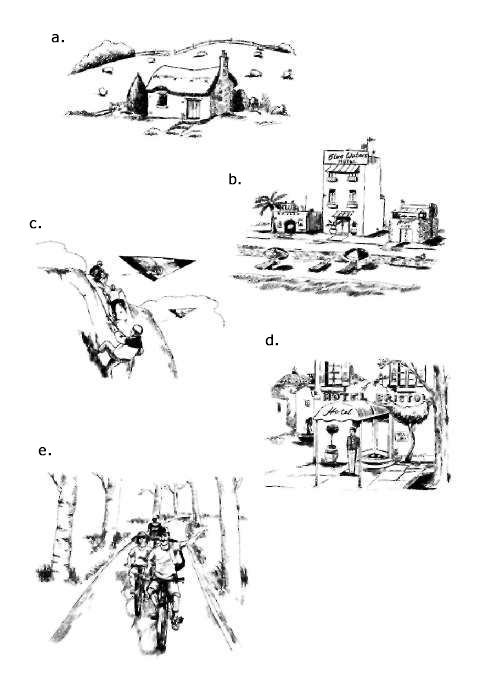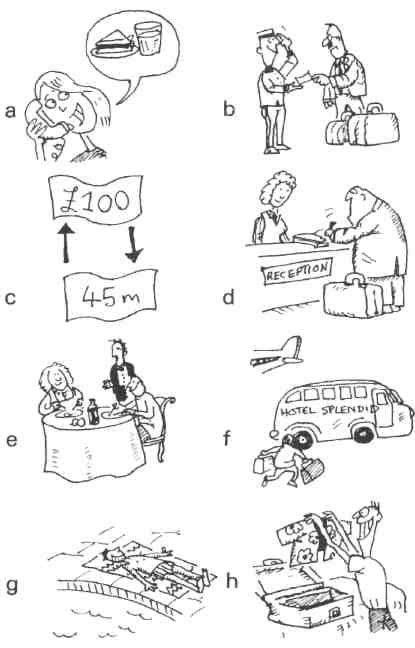
- •Introduction 2
- •1. Weekend and spare time 2
- •2. Travelling 14
- •3. Home town 35
- •4. London 36
- •5. Review 40 weekend and travelling
- •Introduction
- •1. Weekend and spare time
- •1.1 The weekend
- •1.1.1 Grammar and vocabulary practice
- •I can't sit idle. I hate doing nothing.
- •1.2 Harry and svetlana’s weekend
- •1.3 Spare time
- •1.3.1 Hobbies
- •1.3.2 Going out, staying in
- •2. Travelling
- •2.1 How do we travel?
- •2.1.1 Travel and transport
- •2.1.3 Kinds of journey
- •The British on Holiday.
- •2.1.4 Holidays
- •2.1.5 The worst holiday ever!!!
- •2.1.6 Review
- •2.2 Popular tourist destinations
- •2.2.1 General descriptions of tourist destinations
- •2.2.2 Youth hostel and hotel information
- •2.2.3 Holiday brochure
- •2.2.4 Welcome to mexico
- •2.2.5 Review
- •2.3 Effects of tourism
- •2.3.1 Paradise lost
- •2.3.2 Review
- •3. Home town
- •3.1 Helsinki
- •4. London
- •4.1 Around london
- •4.2 The London Eye
- •5. Review
The British on Holiday.
Many British people have decided that it is not worth spending ____ money on ____ holiday in ____ Britain because ____ weather is so unreliable. They prefer to spend their money on package holidays in ____ Southern Europe. ____ package holidays are ____ cheap form of group travel. You pay ____ travel agent ____ sum of money and he arranges ____ flight, hotel, food and entertainment. All you need is ____ pocket money when you get to ____ foreign country. It is sometimes cheaper to go abroad with ____ package holiday than to stay in England. In spite of this, seaside holidays in Britain are still ____ most popular and traditional form of holiday for ____ majority of British people.
Because Britain is quite ____ small island, no one lives farther than 75 miles from ____ sea. As soon as ____ summer weather begins, thousands of people in cars make their way to ____ coast. Many parents are willing to sit on ____ crowded beaches, in traffic jams, and — sometimes — in ____ bad weather, to give their children ____ seaside holiday. Many of ____ towns and villages on ____ South coast of England are still very beautiful, but oil pollution in ____ water has become ____ problem over ____ last few years.
____ seaside is ____ place for ____ family holiday. Many teenagers prefer to go youth hostelling and hitch-hiking around ____ countryside. Youth Hostels are cheap, but ____ accommodation is simple. Hitch-hiking is ____ very cheap way of travelling, but sometimes you have to wait for hours at ____ side of ____ road before you get ____ lift.
____ lot of people enjoy active open-air holidays such as walking or mountaineering. Although British mountains are not so spectacularly high, they are difficult to climb.
____ holiday camp is ____ complete contrast to this kind of independent outdoor holiday. It is not ____ holiday in caravans or tents. It is ____ holiday at special camps where people live in small chalets; special staff look after their children; games are organized, entertainment of all kinds is provided and everyone eats in ____ large dining-hall. Guests never have to leave ____ gates of ____ camp.
Answer the following questions:
1. What is a package holiday? Why do so many British people prefer this form of travelling? 2. What is still the most popular form of holiday in Britain? Why? 3. What problems do British holiday-makers have to face nowadays? 4. What does youth-hostelling provide for teenagers? 5. Why do many British families choose to spend their holidays in special camps? 6. What are the most popular forms of spending a holiday in your country? Which is your favourite one?
2.1.4 Holidays
LISTENING
Task 1. Listen to these five short monologues about holidays. From the eight sets of holiday makers below, choose the most suitable people for each holiday. There will be three sets of holiday makers left over. You might need to check the meaning of the following words and collocations before you start listening.
cordon bleu cooking: the highest standard of cooking
snorkelling: swimming under water using a tube to breathe
hang-gliding: flying while hanging from a frame
scuba diving: underwater diving with breathing apparatus
break: a short holiday
half-board: holiday where breakfast and lunch or dinner is included in the price
put your feet up: have a rest
no sweat, no hassle: without any effort or difficulty
|
|
VOCABULARY PRACTICE
Task 2. There are six typical language mistakes in the paragraph below. Underline them and then write the corrections.
The Smiths stayed at a camping last summer because all other kinds of holiday accommodations are too expensive for them. Every day Mrs Smith had a sunbath, Mr Smith made a sightseeing and the children made a travel around the island. One day they made an excursion to a local castle.
Task 3. Use a dictionary to find compound words beginning with sea-. Complete each sentence with one of these words.
Last year we didn't go to the mountains. We went to the ______seaside____ instead.
There's a restaurant near the harbour that serves wonderful__________.
The beach was covered in piles of smelly green __________.
This town is very high up. It's a thousand metres above __________.
We drove along the __________ but we couldn't find anywhere to park.
Tourists were throwing bread to the __________ flying behind the ship.
Luckily I had taken some travel pills so I didn't feel __________.
Children were building sand castles on the __________.
Task 4. People who help. Fill in the gaps to complete the names of these jobs.
A person who arranges people's holidays and journeys is a __________________. (rtvale tenga)
Someone who goes with tourists as they visit different places is a __________________. (ruto daerel)
Someone who knows about and shows people a particular interesting place is a __________________. (eidug)
Someone who works for a travel company and helps tourists at the hotel is a __________________. (ylodhia ttaievrpeersne )
Someone who looks after passengers on an aircraft is an __________________. (ira sosetsh)
Someone who helps people with their luggage at an airport, station, hotel etc is a __________________. (trerpo)
Task 5. At the hotel. Match the actions on the left with the pictures on the right.
|
|
Task 6. Two of the three words in brackets can be used to complete each sentence below.
The beaches of Spain will be crowded this summer with a record number of foreign __________________. (travellers / tourists / guests)
The Channel Tunnel link between Britain and France will make journeys easier for __________________. (visitors / guests / travellers)
Who's that at the door? I'm not expecting any __________________ at this moment. (tourists / visitors / guests)
These motoring guides are excellent for __________________ here on holiday. (foreigners / strangers / travellers)
The local people dislike visits even from __________________ from their own country. (foreigners / strangers / tourists)
The hotel offered a wide range of services to all __________________ of the conference. (guests / strangers / visitors)
Task 7. Where would you spend your ideal holiday? What kind of accommodation would you stay in? How would you spend your time? Write a small paragraph.


